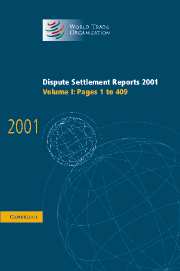Book contents
- Frontmatter
- Contents
- Korea – Measures Affecting Imports of Fresh, Chilled and Frozen Beef (WT/DS161, WT/DS169): Report of the Appellate Body
- Korea – Measures Affecting Imports of Fresh, Chilled and Frozen Beef (WT/DS161, WT/DS169): Report of the Panel
- United States – Import Measures on Certain Products from the European Communities (WT/DS165): Report of the Appellate Body
Korea – Measures Affecting Imports of Fresh, Chilled and Frozen Beef (WT/DS161, WT/DS169): Report of the Appellate Body
Published online by Cambridge University Press: 13 December 2017
- Frontmatter
- Contents
- Korea – Measures Affecting Imports of Fresh, Chilled and Frozen Beef (WT/DS161, WT/DS169): Report of the Appellate Body
- Korea – Measures Affecting Imports of Fresh, Chilled and Frozen Beef (WT/DS161, WT/DS169): Report of the Panel
- United States – Import Measures on Certain Products from the European Communities (WT/DS165): Report of the Appellate Body
Summary
INTRODUCTION
Korea appeals certain issues of law and legal interpretations in the Panel Report, Korea – Measures Affecting Imports of Fresh, Chilled and Frozen Beef (the “Panel Report”). The Panel was established to consider a complaint by Australia and the United States with respect to Korean measures that affect the importation of certain beef products. The aspects of these measures relevant for this appeal relate to, first, domestic support provided to the beef industry and to the Korean agriculture sector more generally, and, second, the separate retail distribution channels that exist for certain imported and domestic beef products (the so-called “dual retail system”) and related measures. The dual retail system is given legal effect by the Management Guideline for Imported Beef (the “Management Guideline”). The factual aspects of this dispute are described in detail in paragraphs 8 through 29 of the Panel Report.
The Panel considered claims by Australia that the requirements imposed on the retail sale of imported beef are contrary to Articles III and XI of the General Agreement on Tariffs and Trade 1994 (the “GATT 1994”); that the tendering process adopted by the Livestock Products Marketing Organization (the “LPMO”) results in quantitative restrictions being applied to grass-fed beef, contrary to Articles II:1, III:4, XI:1 and XVII of the GATT 1994; that discharge procedures for LPMO beef are contrary to Articles III, XI and XVII of the GATT 1994 and Article 4.2 of the Agreement on Agriculture; that restrictions on sales of beef imported by the LPMO are contrary to Article III:4 of the GATT 1994; that Korea applies a mark-up on beef imported under the “Simultaneous Buy/Sell” (“SBS”) system which is inconsistent with Korea's obligations under Articles II or III of the GATT 1994; that the SBS system applies limitations on the import and distribution of imported beef, and imposes labelling, reporting and record-keeping requirements, that are contrary to Articles III and XI of the GATT 1994; and that, in 1997, Korea provided domestic support to its beef industry which resulted in Korea's Current Total Aggregate Measurement of Support (“AMS”) for 1997 being in excess of its reduction commitments for that year, contrary to Articles 3, 6 and 7 of the Agreement on Agriculture.
- Type
- Chapter
- Information
- Dispute Settlement Reports 2001 , pp. 5 - 58Publisher: Cambridge University PressPrint publication year: 2003
- 12
- Cited by

